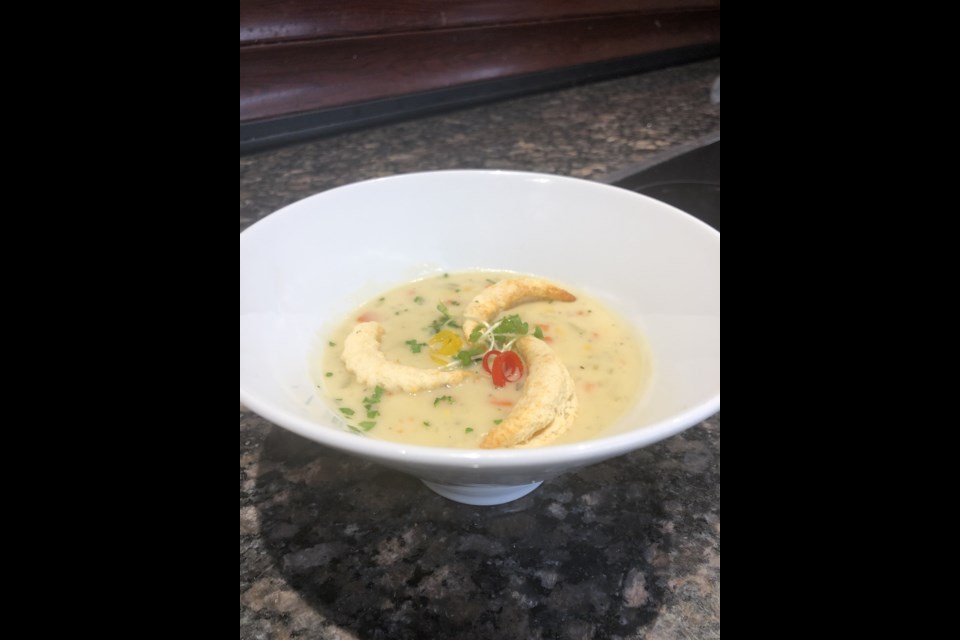Soup… such a simple item. I’ve always found that just about everyone has a favourite bowl and every bowl fills a need.
Not feeling great? Chicken noodle is just what the doctor ordered.
Coming in from a cold winter day, rosy cheeked with a rumbling tummy from a tobogganing run or a game of shinny? Mom says creamy tomato and grilled cheese for the win.
Feeling groggy and a little sluggish after a night of celebrations filled with ample libations and rambunctious fun? Let the deep restorative effects of a steaming bowl of aromatic Pho clear your head and refresh your constitution.
As the Portuguese proverb says: “For each mouth a different bowl.”
Soups are described as a liquid food served warm or hot. They are created by combining ingredients of vegetables and meats with stock, milk or water.
The word soup comes from French soupe ("soup" or "broth"), which comes through vulgar Latin suppa ("bread soaked in broth") from a Germanic source, from which also comes the word "sop," a piece of bread used to soak up soup or a thick stew.
For students of classical French cuisine, soups are classified into two main groups: clear soups and thick soups. Clear varieties of soups include bouillons and consommé. The thick soups are classified depending upon the type of thickening agent used which ranges from pureed vegetables to roux or starches.
Archaeological evidence of soup cookery can be found as far back as about 20,000 BC. The now-common cooking technique of boiling was not so common, at least until the invention of waterproof containers. These were most likely in the form of clay pots.
Prior to pottery, treated animal hides and or watertight baskets of bark or reeds would have been used. The process of boiling the water would have been a tedious one. Rocks were heated and added to the liquid and when cooled removed reheated and the process repeated. Makes one appreciate the modern convenience of a crock pot.
A personal favourite soup of mine has to be the hearty American/Italian classic cioppino.
As the story goes, cioppino was a dish developed in the late 1800s by Italian immigrants who lived in the North Beach neighbourhood of San Francisco. When a fisherman would come back empty-handed, they would walk around with a pot to the other fishermen asking them to chip in whatever they could. Whatever ended up in the pot became their cioppino.
The fishermen who chipped in expected the same treatment if they came back empty-handed in the future.
Its popularity grew and it became a staple in the Italian restaurants of San Francisco.
As cioppino is comprised of the catch of the day its ingredients can change, but in San Francisco this typically would be a combination of Dungeness crab, clams, shrimp, scallops, squid, mussels and fish, all sourced fresh from the Pacific Ocean.
The seafood is then combined with fresh tomatoes in a wine sauce. To truly enjoy this dish, it must be served with toasted bread, either a sourdough or Italian bread.
The first time I heard the story of this wonderful fish soup from the docks of San Francisco, I was reminded of another story I had heard about “stone soup.”
In this European folk story, hungry strangers convince the people of a town to each share a small amount of their food in order to make a meal that everyone enjoys. This story serves as a tale to extoll the value of sharing with others.
I have since heard other variations of the story where the stone had been replaced with other common inedible objects. Some of these variations include axe soup, button soup, nail soup, and wood soup.
Over the past couple of weeks, our culinary students here at Georgian College have been busy learning the basic fundamentals of making a great soup. From the foundation of flavourful stocks to the structure and building blocks of the different varieties to seasonings and flavour profiles.
Our chefs in training are gaining the skills that will help them go on to create their very own bowls.
Of the many soups they get to learn, our students in the Georgian Dining Room are currently making and serving a crowd favourite — sweet corn and carrot chowder. This thick and creamy soup is hearty and when served with the addition of buttermilk and cheddar biscuits always sells out.
I’m happy to share the love of a great soup with you and hope that once our campus dining room is open to public again you book a table and come enjoy a warm bowl with us.
Daniel Clements is the chef technologist at Georgian College’s School of Hospitality and Tourism.
